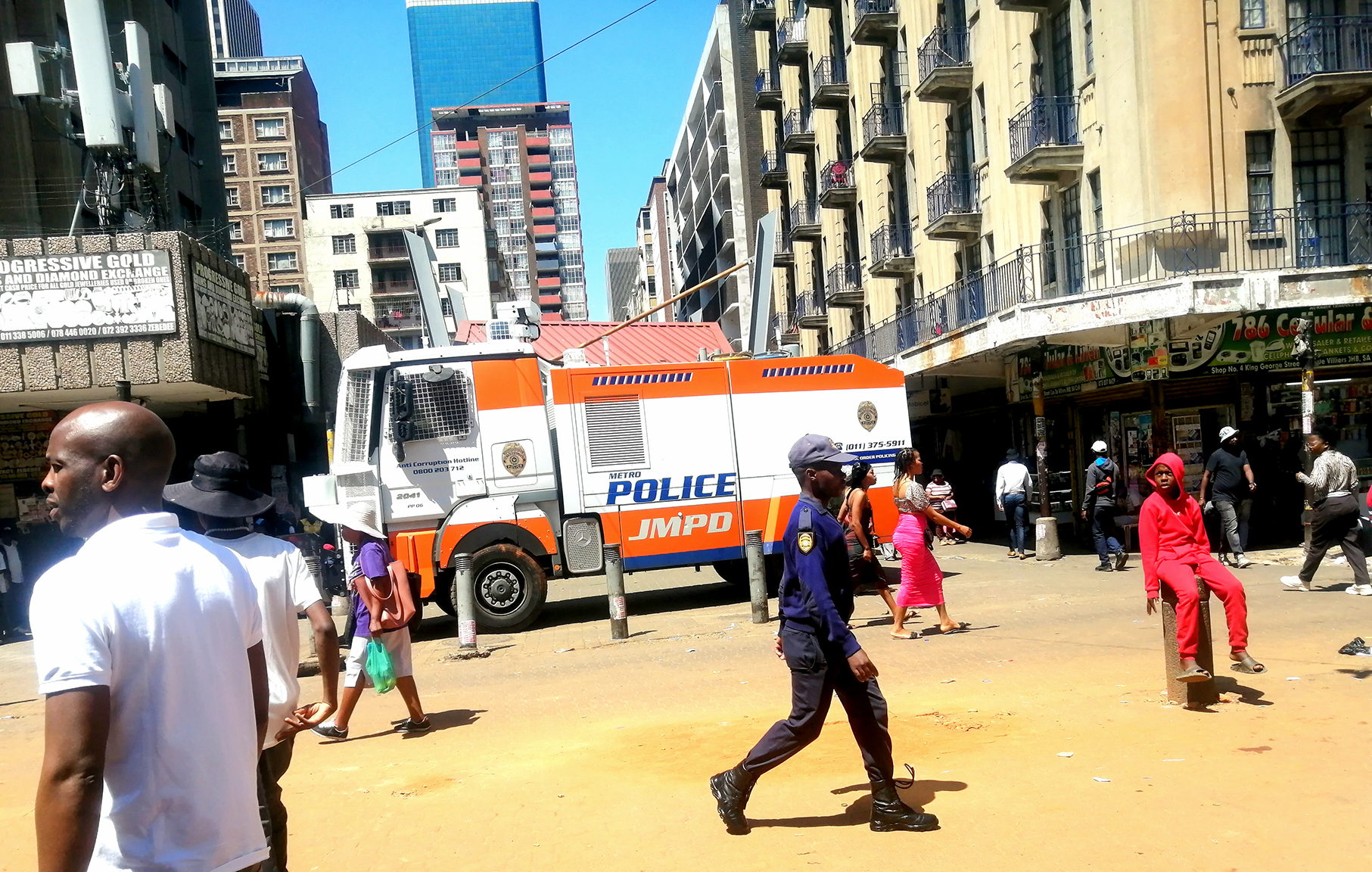“Dunusa” is isiZulu for “bend over”. In Johannesburg, it aptly describes the process of searching through mountains of clothes in the inner city. People from all walks of life would shop at the popular Dunusa informal thrift stalls on De Villiers Street, near the MTN Taxi Rank, in search of cheap but quality, fashionable clothing.
That was, until recently.
/file/dailymaverick/wp-content/uploads/2025/10/pic-1-1.jpg)
The City of Johannesburg has restarted its informal traders permit process in the inner city and, at the same time, embarked on a clean-up programme, sending in the Johannesburg Metropolitan Police Department (JMPD) to clear informal traders from the street.
The informal traders on De Villiers Street said the JMPD started evicting them on 2 October. The city has since planted trees on the sidewalk where the popular thrift stalls were located.
/file/dailymaverick/wp-content/uploads/2025/10/557629792_1373416354789786_7725753625673764757_n.jpg)
TikTok users documented the eviction. While there were rumours that the taxi industry had taken the space, and some taxis were parked there in the days after the traders were evicted, Daily Maverick could not confirm whether the taxi industry had any formal agreement to operate in the area, and the taxis appeared to be opportunistic.
/file/dailymaverick/wp-content/uploads/2025/10/IMG_20251008_111046_1.jpg)
@acekhxpwi3pno more dunusa at Johannesburg 🥺♬ suara asli - milenia - 🅄🅻🄸🅽🄽🆄🄷🅰
Chris Nabike, an informal trader who runs a store on the street and also sold clothes on the sidewalk, was on the street when the JMPD first arrived.
“Suddenly, I saw people running. Some [carried] part of the stock they could salvage in the process,” said Nabike.
He said there was an intense confrontation between the JMPD and informal traders, who were worried about having their stock confiscated. Nabike said the JMPD took some of his stock.
“There were lots of insults thrown around by some of the informal traders who shouted that they also had a right to trade in the country,” he said.
The 51-year-old Nigerian said he had been trading on the streets of Johannesburg for decades.
“It’s not only me. Everybody here is crying. Everybody. Even [the nearby] Boxer store is crying.”
Nabike said many of the evicted informal traders had trading permits, although he did not respond to questions on whether the permits were still valid.
“They all have permits,” he stated. “We have been operating here for a very long time.”
/file/dailymaverick/wp-content/uploads/2025/10/IMG_20251008_111800.jpg)
‘Reclaiming our streets’
In a statement on 7 October, the city said it had resumed the registration, application and issuance of informal trading permits, starting with the inner city. While acknowledging that informal trading played a “vital” role in the city’s economy, it said the initiative aimed to ensure the sector was properly regulated.
On the same day, Johannesburg Mayor Dada Morero posted on Facebook that “strong progress” was being made on De Villiers Street as the city intensified “efforts to reclaim this vital corridor”. His post included pictures of trees being planted on the street.
“Our mission is unwavering,” he wrote, “we will not retreat from reclaiming our streets. We are dedicated to restoring order, dignity, and opportunity across every part of our city.”
The city did not respond to Daily Maverick’s questions. The JMPD, however, said its operation was “in response to persistent safety, public health and urban management concerns”.
The JMPD’s Xolani Fihla said key factors behind the operation included the informal traders “severely obstructing pedestrian movement and, in some cases, vehicular access, which violates municipal bylaws designed to ensure the free flow of traffic and pedestrian safety”.
He also cited issues of illegal dumping and insufficient sanitation.
“The action was necessary to address non-compliance with the City of Johannesburg’s informal trading bylaws, specifically in an area where the current level and structure of trading had become unsustainable and contrary to the city’s urban planning framework for that specific street.”
While Fihla didn’t respond directly to a question on whether all traders or just those without permits were targeted, he said, “The enforcement action was primarily directed to clear out the whole area to restore order and address safety concerns.”
Traders out of work
Sarah Munengue was one of the informal traders at Dunusa. The 46-year-old Malawian national told Daily Maverick she lost the bulk of her stock during the evictions. She admitted that she did not have a valid trading permit.
“This is inhumane. How are we expected to sustain our livelihoods when sand is thrown at the very bread we are trying to put on the table through honest means?
“I am only trying to make a living and have no desire to steal from anyone, and I don’t know how that has become a crime,” she said.
Another trader, Elvis Kelechi (55), from Malawi, said: “This is disheartening, really. Would the City of Johannesburg rather prefer us without an income? Surely the fact that we are making an honest living by selling on De Villiers Street should count for something and bring the city to some trading agreement?”
Retailers near Dunusa said their businesses had suffered since the traders were removed, with fewer people visiting the area.
“The evictions have greatly affected my business because a lot of people come here, and once they are done buying clothes, they would buy other stuff like food and other items from my shop,” said Siam Perazi (19), who runs Gulshawn Wholesale and Retail.
/file/dailymaverick/wp-content/uploads/2025/10/IMG_20251008_110438_1.jpg)
Support for evictions
“They are not wanted here,” a Gauteng crime prevention warden on De Villiers Street shouted when asked by Daily Maverick about the evictions, apparently referring to the foreign nationals involved in the trading.
“They are not wanted here; they must go back where they came from. We want the city to stay clean.”
Nondumiso Makhathini, from Soweto, welcomed the evictions of the informal traders.
“It encouraged all types of illegal activities, noise and filth,” she said. “I have avoided that area of town because criminals are always on the lookout for potential victims.”
The area around the MTN Taxi Rank is synonymous with crime.
“This should happen across Johannesburg on a daily basis,” said Johannes Mbele, from the West Rand.
Others, however, expressed a sense of loss.
“Where do they expect us to get such cheap clothing when everything has fallen apart?” asked Kensington resident Precious Mamabolo.
Attempt to return
On Friday, 10 October, the Dunusa traders attempted to return to De Villiers Street and continue operating. The JMPD swooped on them and closed their stalls again.
On 10 October, Morero posted on Facebook, “We stand ready to face any challenge, our resolve to reclaim Johannesburg’s streets is unwavering. We will persist in acting decisively and fairly to secure public safety and order.”
He said a JMPD command post bus had been deployed to “definitively address lawlessness and restore order. Any individuals who refuse to comply with the city’s bylaws will be arrested immediately.”
On Monday, 13 October, Morero said the city was targeting Hillbrow “to reclaim it completely”.
“Hillbrow has long been labelled the capital of crime, a place of neglect, decay, and broken services, dismissed by the world. That era ends now.”
Possible court challenge
“Those are our members,” said Brian Phaaloh from the South African Informal Traders Forum.
“We won’t let the city do as they please. We are working very hard to challenge their actions.”
Phaaloh said the forum expected to file a court challenge this week. This isn’t the first time Dunusa traders have been removed, and they have won court victories which saw them return to the site.
“Political pressure is the only reason [for the removals]. They want to be seen as if they are doing something, as most of the members selling there were not born in the country,” said Phaaloh.
While anti-foreigner sentiment appears to have risen in recent years, symbolised by the actions of Operation Dudula, the City of Johannesburg is also under significant pressure to clean up the streets ahead of the November G20 summit, while campaigning for the local government elections, expected to be held in late 2026, is already under way. DM





 Johannesburg Metro Police Department vehicles stationed near De Villiers Street in Joburg's CBD, from where informal traders were evicted on 2 October. (Photo: Bheki Simelane)
Johannesburg Metro Police Department vehicles stationed near De Villiers Street in Joburg's CBD, from where informal traders were evicted on 2 October. (Photo: Bheki Simelane)